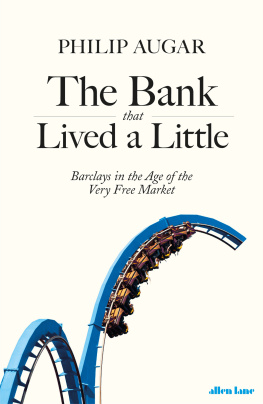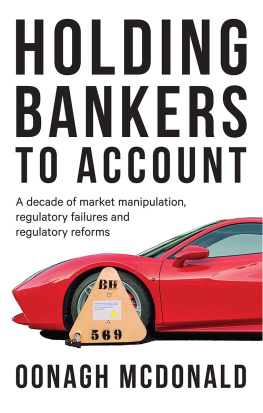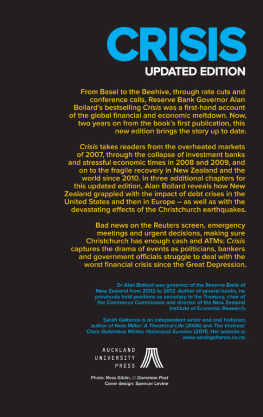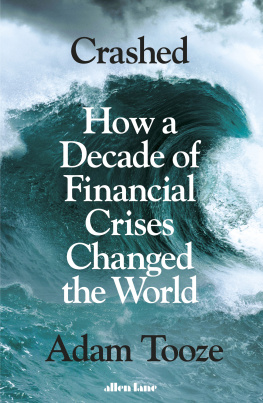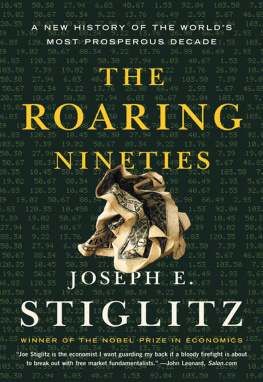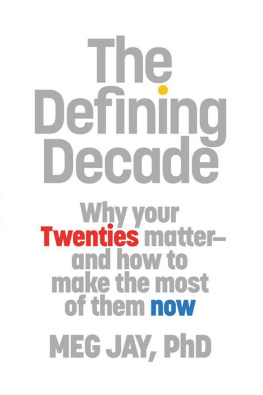R ECKLESS B RAIN S HOT
The Rise and Fall of the City
Philip Augar

L ONDON
This eBook is copyright material and must not be copied, reproduced, transferred, distributed, leased, licensed or publicly performed or used in any way except as specifically permitted in writing by the publishers, as allowed under the terms and conditions under which it was purchased or as strictly permitted by applicable copyright law. Any unauthorised distribution or use of this text may be a direct infringement of the authors and publishers rights and those responsible may be liable in law accordingly.
Epub ISBN: 9781407073651
Version 1.0
www.randomhouse.co.uk
Published by The Bodley Head 2010
Copyright Philip Augar 2010
Philip Augar has asserted his right under the Copyright, Designs
and Patents Act 1988 to be identified as the author of this work
This book is sold subject to the condition that it shall not,
by way of trade or otherwise, be lent, resold, hired out,
or otherwise circulated without the publishers prior
consent in any form of binding or cover other than that
in which it is published and without a similar condition,
including this condition, being imposed
on the subsequent purchaser.
First published in Great Britain in 2009 by
The Bodley Head
Random House, 20 Vauxhall Bridge Road,
London SW1V 2SA
www.bodleyhead.co.uk
www.rbooks.co.uk
Addresses for companies within The Random House Group Limited can be found at:
www.randomhouse.co.uk/offices.htm
ISBN 9781407073651
Also by this author
The Death of Gentlemanly Capitalism:
The Rise and Fall of Londons Investment Banks
The Greed Merchants:
How the Investment Banks Played the Free Market Game
Reckless:
The Rise and Fall of the City
I
The Lord Mayors Banquet for Bankers and Merchants also known as the Mansion House Dinner is one of the City of Londons showpieces. It is attended by the most powerful people in finance and is addressed every year by the Governor of the Bank of England and the Chancellor of the Exchequer.
The 2007 dinner took place on the evening of 20 June. Britain was enduring its worst summer for many years but the weather did not dampen the spirits of Chancellor Gordon Brown as he made his way to the top table to the traditional slow handclap from the Lord Mayors 350 guests. For Tony Blair had finally agreed to stand down and in less than a fortnight Brown would achieve his long-standing ambition of becoming prime minister.
Having completed ten years at 11 Downing Street, he had been the longest-serving Chancellor in British history and apparently one of its most successful. He even appeared to have given the lie to one of his favourite jokes: there are two types of Chancellor, those who fail and those who get out in time.
Browns jubilation was understandable. Britain had enjoyed continuous prosperity between 1997 and 2007 and much of the credit was given to him for his prudent management of the economy. At the Mansion House that night he was not going to miss the moment, promising to ensure Britains macroeconomic framework remains a world benchmark and looking back on an era that history will record as the beginning of a new golden age for the City of London. Many of those present had been at the Mansion House the previous year when Brown had delivered a eulogy to the robust health of the British economy and the principles he had followed to get it there. He name checked Adam Smith, the eighteenth century Scottish philosopher whose work on market forces had influenced him, and Alan Greenspan, the US central banker most closely identified with free market globalisation. Brown boasted that, Government debt in Britain is lower than France, Germany, Italy, America and Japan, while growth in Britain was expected to be stronger this year than last and stronger next year than this.
His 2007 speech was also upbeat and many of his friends from the City were there to hear it. Chancellor Browns speech that evening lavished the bankers with praise. They were told that Over the ten years that I have had the privilege of addressing you as Chancellor, I have been able year by year to record how the City of London has risen by your efforts, ingenuity and creativity to become a new world leader..... The financial services sector in Britain and the City of London at the centre of it, is a great example of a highly skilled, high value added, talent driven industry that shows how you can excel in a world of global competition. Britain needs more of the vigour, ingenuity and aspiration that you already demonstrate that is the hallmark of your success. He quoted many statistics to back up his comments: over 40 per cent of the worlds foreign equities were traded in London, more than in New York; over 30 per cent of global currency trading took place in London, more than in New York and Tokyo combined; and more than 80 per cent of the Citys business is international.
It was an ill-advised speech under the circumstances. Although most investment experts shared Browns optimism, there were enough warning signs to have suggested caution and indeed the previous speaker, Mervyn King, the Governor of the Bank of England, had warned about the degree of leverage in the global financial system. He said, Excessive leverage is the common theme of many financial crises of the past. Are we really so much cleverer than the financiers of the past?. Most of those present probably thought yes, we are but events were already proving otherwise for by June 2007 the American housing market had been on the slide for a year with falling prices and more and more borrowers defaulting on their loans. Big companies of the kind that the Chancellor and his advisers ought to have noticed were showing the pain. In February 2007 Britains biggest bank HSBC had warned of write downs on its US mortgage book and in April 2007 Americas largest mortgage lender, Countrywide Financial shocked the market with a 37% profits fall.
What few people understood in June 2007 was the extent to which the global financial system ultimately depended on the US real estate market. Many of the worlds largest financial institutions including most of the British banks had invested in securities linked to US mortgages and would suffer heavy losses when asset prices plunged. Worse still, what happened to US real estate would also happen in other countries including Britain. Confidence would evaporate, banks would no longer be able to rely on investors to provide the cash flow to fund their lending and a vicious circle would evolve, gumming up the worlds banking system. How did this position arise?
II
The media is now full of what Sir Howard Davies, once Britains chief financial services regulator and now Director of the London School of Economics, calls Harry Hindsight and the blame game is in full swing. The usual suspects include regulators asleep at the wheel; central bankers, especially Alan Greenspan, who encouraged the credit bubble by baling out markets whenever they were in trouble; ratings agencies who were too generous in their assessment of credit risk; speculators whose short selling of troubled financial stocks drove share prices down; complacent non-executive directors too close to strong willed chief executives to challenge them and greedy bankers who miss priced risk, ignored whistleblowers and made away with their riches while their companies failed.
Next page

